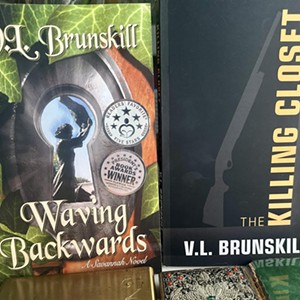When most people think of a "composer," they think of a dead European dude with a powdered wig. Texas-born, Yale-educated, 41-year-old Christopher Theofanidis is none of those, but he is one of the most prolific young composers in America today.
He has written new works for a diverse range of ensembles, from the Houston Symphony Orchestra to the Orpheus Chamber Orchestra to the Brooklyn Philharmonic to the American Ballet Theatre. But one of his most fruitful relationships has been with the Atlanta Symphony Orchestra and its renowned music director and conductor, Robert Spano.
The esteemed Spano has commissioned numerous works from Theofanidis, including the one the ASO will perform this Sunday at the Johnny Mercer Theatre. Titled simply "Symphony," the work is the first part of an ambitious double bill which concludes with the great Marcus Roberts soloing on George Gershwin's Concerto in F.
We spoke with Theofanidis, who will speak at the pre-concert talk, recently by phone.
Tell us how this new work came to be.
Chris Theofanidis: I've got a longer relationship with Robert Spano that goes back to about 2000. Something that's amazing about him is he has your longer term interests at heart. I've done other pieces for him and he thought the symphony would be a nice next step to take on a bigger scale work. That's how the project came about - he suggested something larger scale for orchestra but as usual for him he doesn't put any restrictions on anything. I knew I wanted to do something about 30 minutes long, and this is 35, in four movements, and that makes it have a real symphony feel to thee piece.
What's the name of it?
Chris Theofanidis: It's just "Symphony." I wasn't sure if I was going to ever do another symphony again, so I didn't want to call it "Symphony Number One."
You didn't want to sound presumptuous.
Chris Theofanidis: Exactly. But this is for sure a big milestone in terms of my writing and the scale of this piece for so. A lot of other pieces I've written have been 12 13 minutes, or a concerto.
Looking over your resume, you're a remarkably prolific composer.
Chris Theofanidis: Yes, almost miraculously given that I've been teaching and doing all these other things as well as composing. I've had a pretty steady output. I've done other pieces, I did a ballet for American Ballet Theatre, I've done several operas as well. I've been pretty steadily busy.
In my experience, classical music audiences tend to want the hits, while musicians appreciate something new every now and then. True?
Chris Theofanidis: I think so. Each orchestra has its own inner psychology about that kind of thing. Atlanta partially because Robert Spano has been so interested in having new works be part of their performances. And he's very careful he doesn't program music that will alienate audiences. He does other things, like having videos with composers talking about the pieces, very audience-friendly things.
Your music is indeed very accessible. Is this by plan as a marketing thing, or is it just how you write?
Chris Theofanidis: It's just the way I write it. Every composer's an audience member. They want to write something they want to hear, and that's where it starts from for the most part. A lot of those choices come from very deep feelings about harmony and melody and those feelings hopefully come out in the music. I'm not trying purposely to become more or less audience friendly, it's part of my own personal taste.
One of the things ASO does that's great is they really put composers out in front as much as anybody. Look at any other symphony orchestra roster and they're more likely to promote their soloists - Sarah Chang or Itzak Perlman or people like that will get front billing. But Atlanta's been very good in promoting composers equally. I think what that does is make people curious about it.
The ASO maintains a great national reputation despite the fact that the deep South is not where most people expect a world-class orchestra to be. Is this largely due to Spano, or is it more of an institutional thing?
Chris Theofanidis: Atlanta's always had a great history and certain things they've done have really popped out on the national stage, like their amazing chorus with Robert Shaw. But their music directors have always had a lot of stature. What Robert particularly brings to it is kind of, "Let's try this, let's see if it works." That's an invaluable thing, particularly with an institution as conservative as a symphony orchestra. The important thing is he's got the balance right. A lot of people might come in and say, "Let's see if this works, and if it doesn't we'll make it work no matter what," and I don't think he's got that attitude either. He has a genuine curiosity and playful spirit.
Have you ever been really sorry to have a new work performed by particular conductors?
Chris Theofanidis: Sometimes, that can definitely happen. Many years ago I heard an account of some New York musicians saying why Leonard Bernstein was such a great conductor. And they said, "Because he trusted us." Meaning that he didn't get in the way of things that they really had brought to the table. That's something Robert is impeccable at. He knows when to step out of the way without any ego. His judgment in getting involved and stepping back is really good.
I have had conductors who almost bullied their way into the piece. They've gotten involved in very basic decisions that shouldn't have been part of their domain. That's a difficult situation because the conductor is the person the composer deals with. If that relationship isn't good, you're in trouble.
I've had experiences where conductors have been interested in having things changed. That's where I feel very uncomfortable. That should be left to the composer.
Robert, he actually composes. He doesn't like to admit it but he's got an amazing composition mind. He's a great resource. Inevitably 90 percent of what he says I end up doing because I really respect what he's saying. He's looking out for you as a composer.
This piece is something he gave two reading sessions for. We had a reading of the first part in January and actually this week we'll have a reading session in Atlanta for the remaining part. That's just a huge help. It's almost unheard of, really, there are very few orchestras that will do that. I think it's a testament to Atlanta that they want to help you do the best thing you can do. These reading sessions last an hour, two hours, so you can basically use the orchestra to figure out if certain sections are working, the pace, the orchestration.
Sort of like a theatre workshop.
Chris Theofanidis: Exactly, except in the orchestral world you almost never get that opportunity.
It seems like film scores are a huge driver of orchestral composition . How much have film scores influenced you as a composer?
Chris Theofanidis: In my time in school up until now there's been a real shift. It used to be that concert composers were afraid to go in that direction for fear of commercialization. Now if you look at the survey of film composers, most come from the concert world. Major figures are actively involved in writing film music as much as concert music. That's great for all of us.
I grew up in a nation that itself grew up with a lot of visual stimulation, so I'm sure that it's in my psyche. It often occurs to me that something might have a visual feeling to it. I'm not trying to create a soundtrack to an imagined visual story, but at the same time, some people have said my music has that kind of quality to it.
And it is a real specific kind of talent. Not every concert musician can do film at all. You have to have a great sense of when to get out of the way and when to surge, and that kind of thing. And to be able to do it in a ten second clip is really tough. I'm full of admiration for everyone who goes in that direction.
When I started writing I did some documentary film scores. But the turnaround time is really quick. You have a month or something to put together a film score. It's a totally different way of working.
What advice would you give for the gifted musician who maybe doesn't want to be a conductor or schlep from audition to audition, but instead wants to be first and foremost a composer?
Chris Theofanidis: The main thing every student has to figure out for themselves is what they actually love in music. Eventually that becomes your voice, your style, your synthesis of all those things you love. For me the composers I loved growing up, I tried to figure out what made that music really work me. Conversely, you want to figure out why you don't like the things that don't work for you. You move closer to the things your own voice by understanding the things you deeply love about music. That's where to begin for sure.
The career side is a lot more tricky. Meeting Robert Spano for example was a huge thing, and it was almost a coincidence. It was a very happy moment that I had very little to do with. Sometimes you can't make these things happen.
Atlanta Symphony Orchestra
Under the direction of Robert Spano, the ASO presents the world premiere of Christopher Theofanidis's "Symphony" and Marcus Roberts performing George Gershwin's Concerto in F.
When: 3 p.m. April 5
Where: Johnny Mercer Theatre
Cost: $45-75
Info: savannahmusicfestival.org























